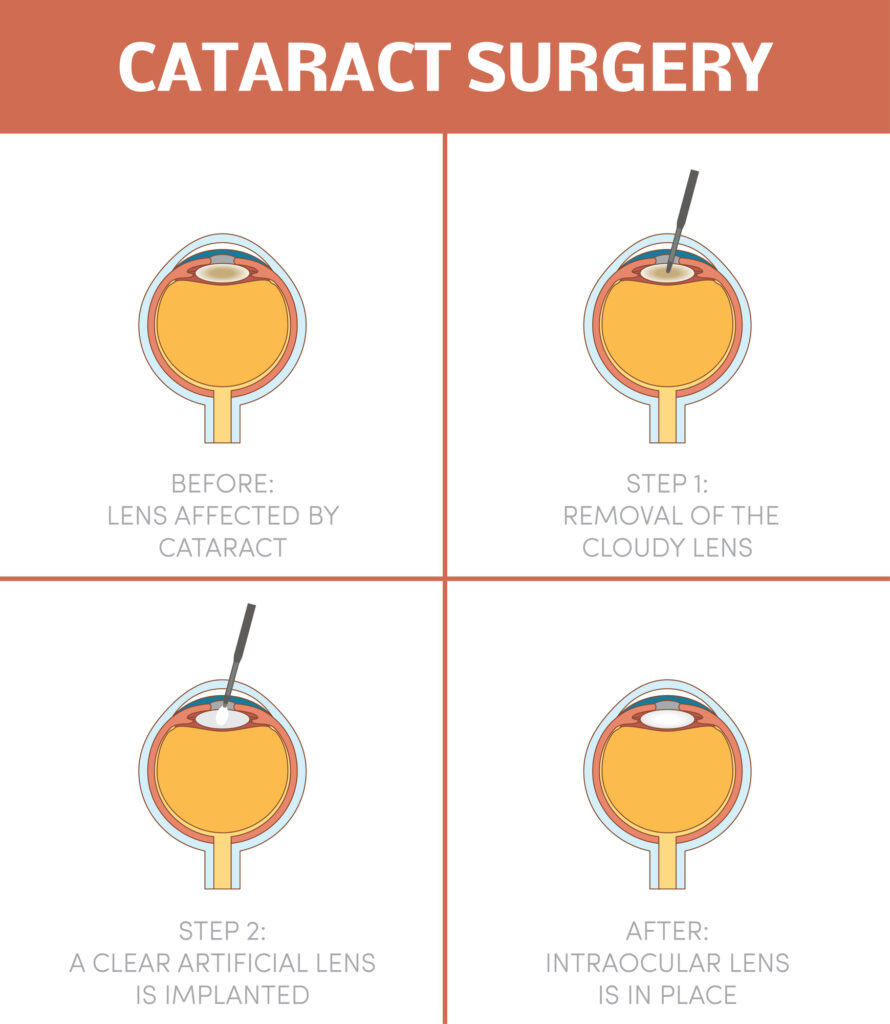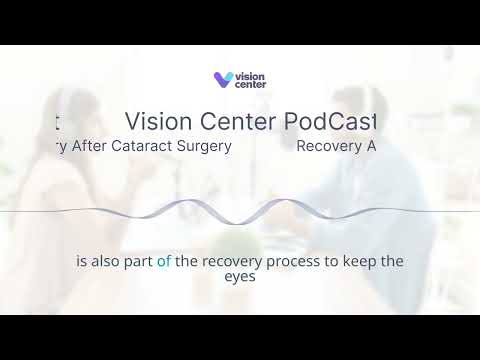Cataract surgery is an outpatient procedure that removes a cloudy, dysfunctional eye lens and replaces it with an artificial clear intraocular lens (IOL).1 The operation lasts under an hour, and the new lenses are maintenance-free.

There are about 28 million cataract surgeries worldwide each year. Approximately 4 million take place in the United States.2
Cataract surgery aims to enhance your vision. Ophthalmologists combine this operation with other procedures like glaucoma surgery.3
7 Cataract Surgery Recovery Tips
To promote healing and avoid eye complications, you’ll need to follow the post-operation care guidelines your doctor provides.8

Below are seven essential recovery tips for cataract surgery:
1. Avoid Driving
Most people can resume driving a day after cataract surgery. However, others experience blurry vision that can last for several days. Operating a vehicle is dangerous in these cases.
To be safe, consider doing the following:
- Find a friend or family member to drive you to and from the surgery
- Plan for reliable transportation for your follow-up appointments
- Consult your doctor first, even when you think you’re fit to start driving again
- Wear a pair of driving glasses or sunglasses to prevent excess light from harming your eyes when you begin driving
2. Avoid Strenuous Activity
Intense activities and certain postures can increase eye pressure and interfere with healing. Therefore, avoid these as much as you can:
- Heavy lifting
- Contact sports
- Specific postures, such as bending that puts your head below your waist
- Sneezing or vomiting
Before returning to regular activities, talk to your doctor about your eyes’ stability and potential risks.
3. Avoid Water Contact
Water contains bacteria and other germs. Exposure to shower, river, or ocean water after surgery can cause an infection.
To be safe, wait at least 24 hours after surgery before showering. Remember to prevent the water from getting in your eyes when you shower. Moreover, speak to your eye doctor before resuming activities like swimming and bathing in the hot tub.
4. Avoid Rubbing Your Eyes
Rubbing your eyes after cataract removal may interfere with the incision site. Your hands can also introduce bacteria to the site and cause infection.
To avoid rubbing your eyes, use the prescribed eye drops to soothe discomfort. Wearing an eye shield at night can also prevent you from accidentally rubbing your eyes while you sleep.
5. Protect Your Eyes
After surgery, your eyes are prone to irritants, dust, and other trauma. Your eye doctor may give you protective sunglasses to shield your eyes during healing.
They may also give you an eye shield to protect them from accidental injury while you sleep. You can also use sunglasses to protect your sensitive eyes from excess light that can lead to discomfort.
6. Avoid Makeup
Avoid applying anything to your face and eyes for at least two weeks. Don’t wear eye makeup, such as mascara, eyeliners, and artificial eyebrows. They can promote bacteria growth and lead to infection.
7. Follow Your Doctor’s Advice
During the first few weeks of recovery, take all correct medication dosages promptly. Contact your doctor immediately if you notice any concerning side effects like vision loss or eye pain.
Listen In Q&A Format
Recovery After Cataract Surgery
Vision Center Podcast
What to Expect After Cataract Surgery
After cataract surgery, you can anticipate a period of recovery where certain precautions and steps are necessary to ensure proper healing. Here’s what to expect:
- Discomfort or itching: It’s common to feel discomfort or have an itchy sensation in the operated eye. It’s crucial to avoid rubbing or squeezing the eye to prevent disrupting the healing process.
- Medication: Your eye doctor may prescribe medicated eye drops and antibiotics to prevent infections. They also help manage inflammation and eye pressure.5
- Eye protection: Use an eye patch or a protective shield over the eye for a few days post-surgery, especially during sleep, to avoid accidental self-injury.
- Follow-up visits: Schedule a follow-up appointment with your doctor within 24 to 48 hours after the surgery. Moreover, continue these visits to ensure a safe recovery.
Potential Side Effects
You may experience the following side effects the first day or two after surgery:
- Blurry vision due to pupil dilation
- Sensitivity to bright light (photophobia)
- Glares and halos around lights
- Gritty and scratchy eyes
- Drooping, swollen eyelids
- Swelling
- Mild pain for a few days
Your pupil will return to its normal size after a couple of days. This change will result in clearer vision.
When Should You Seek Medical Attention After Cataract Surgery?
Seek immediate medical attention if you experience any of the following:
- Decreased or lost vision
- Severe eye pain
- Severe reddening of the eyes
- Sticky eye discharge
- Clouding of the cornea
- Bleeding eyes
- Inflammation
Recovery Time
After cataract surgery, you can expect to see improvements in your vision. Here’s an overview of the recovery timeline:
- Experience clear within a few days post-surgery, though individual healing rates vary
- It may take one to two weeks for some to see images sharply
- Expect complete recovery and healing within eight weeks
- The procedure has a high success rate of about 99%, so complications are rare 6
A possible complication includes cloudiness or posterior capsule opacification, which can develop months to years later. If this occurs, a YAG laser capsulotomy, a straightforward and painless laser treatment, can correct this issue.7
Preparing for Cataract Surgery
Cataract surgery is safe. However, preparation is essential to ensure optimum results and to avoid complications.
Proper preparation for cataract surgery also ensures that aftercare is easier. Each step of the preparation process can minimize potential complications and optimize the condition of your eyes and general health for surgery.
Before surgery, your eye doctor will conduct an ultrasound test to determine your IOL type. IOL choice depends on eye length and the curvature of the cornea.
To prepare for surgery, you should:
- Stop taking aspirin or anti-clotting drugs, as these may interfere with normal bleeding
- Stop taking prostate medication such as Flomax since these alpha-blockers interfere with iris muscles during cataract surgery
- Avoid wearing makeup such as mascara, eyeliners, and false eyelashes
- Wash your face with soap and water on the day of surgery
- Abstain from drinking alcohol at least 24 hours before the procedure
- Avoid wearing contact lenses at least 3 days before the operation
- Ask a friend or family member to drive you home after surgery because you may experience blurry vision
- Have a friend or family member arrange to drive you home post-operation, as you may have blurry vision
- Use antibiotic eye drops a day or two before the surgery to prevent infection and inflammation4
Summary
- Cataract surgery is the mechanical removal of a cloudy lens and replacement with an artificial one (Intraocular lens or IOL).
- The success rate of cataract surgery is about 99%.
- While cataract surgery is considered safe, preparation is important to ensure optimum results and to avoid complications.
- Successful recovery is possible if you avoid rubbing your eyes, wearing makeup, indulging in strenuous activity, and neglecting your eyes.
- Following the post-op care tips, seeking medical advice, and frequent checkups will promote a successful healing process.
In this article








